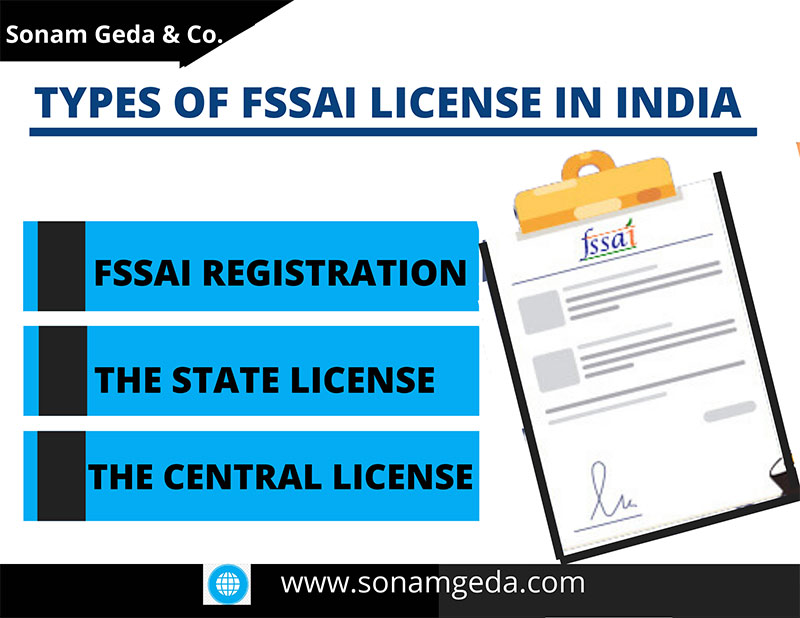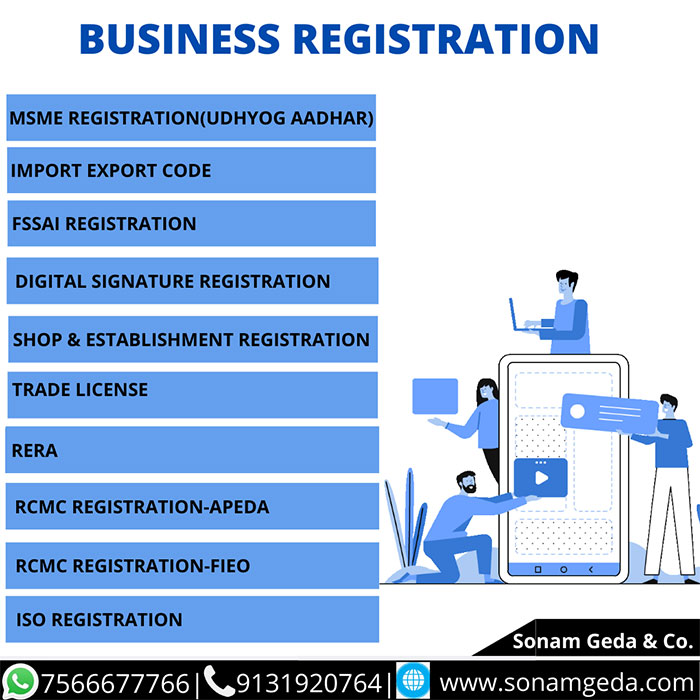FSSAI Registration
Overview
If a business entity wants to pursue its business operations in food production, food packaging, food processing, or food distribution, it has to undergo registration with Food Safety and Standards Authority of India.
FSSAI was created to monitor these industries and their operations according to the guidelines and regulations listed under its act 2006.


Documents required for the Registration
Some documents that are to be submitted along with the application for the FSSAI registration are enumerated below:
- For FSSAI registration:
- For Individual:
• Passport size Photo
• Either Aadhar card/voter id/driving license
• Mobile number and mail address
• Nature of Business - For proprietorship concern:
• Passport size Photo of Proprietor
• Either Aadhar card/voter id/driving license of Proprietor
• Mobile number and mail address of Proprietor
• If concern name is to be included then any registration document of proprietorship firm (Shop establishment license, GST Registration, Trade license, MSME certificate)
• Nature of business - For Partnership concern:
• Passport size Photo of Authorized Partner
• Either Aadhar card/voter id/driving license of Authorized partner
• Pan card of partnership firm
• Mobile number and mail address of Authorized partner
• Nature of business - For Company/LLP:
• Passport size Photo of Authorized director / Authorized Designated Partner
• Either Aadhar card/voter id/driving license of Authorized director / Authorized Designated Partner
• Memorandum of Association
• Pan card of company
• Mobile number and mail address of Authorized director / Authorized Designated Partner
• Incorporation Certificate
- For Individual:
- For state and central license:
• Address proof
• Import and export code
• a separate passport sized photograph
• list of directors or partners of the firm
• incorporation certificate of the firm
• the MoA and AoA of the organization
• an identity proof with the photo
• NOC from the local municipal corporation - For the food producing industries, along with the above documents, the following documents are also required:
• Blueprint of the warehouse, plant, or the storage facility
• List of the total machinery present in the organization
• Water test report
• List of all the category of the food items, the organization is going to deal in.
Benefits of the License
- This license increases the credibility of the business firm as the era which we are living in is digital era. Anyone can have a review the license of the firm. Consumer are well aware of the food they eat.
- It increases the goodwill of the firm as the logo of FSSAI is well recognized worldwide by the consumers.
- All the processes starting from the production to the distribution of the food products are narrowed or streamlined.
- Manufacturing of the food products are converted more towards science based principles such as use of more machines to reduce the contact of the human body with the food products.
- The registration provides grounds to the business to produce food products according to the international safety standards.
- Business entities have huge chance to grow as the registration under this influences the consumer positively towards the business firm for their dependency on them for their food products.
- FSSAI license is important to export food product to other nations.
- FSSAI lays down general guidelines and procedures to produce food products as per ISO17025.



Types of FSSAI license in India
Some documents that are to be submitted along with the application for the FSSAI registration are enumerated below:
- FSSAI registration: this type of the license is issued for the following:
• Business entities whose turnover is less than Rs.12 lakhs per annum
• Dairy and other FBOs who has a limited capacity of less than 500ltrs/day.
• Food traders like canteens, tea shops, etc. this license can be upgraded as soon as the business starts to expand. - The state license: this type of the license is issued for the business entities which has a turnover of more than 12 lakhs but less than the sum amount of the 20 crores.
• Dairies and FBOs which has a daily capacity of more than 50,000ltrs.
• Hotels with a rating of 3 stars or above. - The central license: this registration is considered for the big of large traders or food producers/ suppliers.
• Companies that supply their food products to government offices/ departments.
• Food traders that have a turnover over 20 crores annually.
• Business entities which are involved in import and export of the food products on large scale.
Non compliance with FSSAI regulations
Non-compliance with the FSSAI regulations may prove to be costly or the business entity can have huge penalty for it. It may also have an adverse effect on the brand image of the business.
Food regulation inspections will be conducted by the food safety officers. After the inspection, the compliance level will be granted to the business entity. This grading is conducted as given below:
• Compliance
• Non-compliance
• Partial compliance
• Not observed or not applicable to the business.
According to the markings provided above, the inspection officer might demand for some changes or improvements in the operations. For this he/she might provide a notice to the business. In severe cases, the license of the business entity might get cancelled by the officer if the improvements in the standards are not maintained even after the warning by the officer is given.


Subscribe Our Newsletter
Get useful latest news & other important update on your email.





